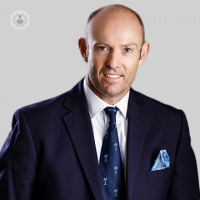What are clavicle fractures, and how common are they?
Autore:In one of our latest medical articles here below, distinguished consultant orthopaedic surgeon, Mr Graham Tytherleigh-Strong, tells us what a clavicle fracture is before going on to outline the related symptoms and causes.

How common are clavicle fractures?
Fractures of the clavicle, commonly known as the collarbone, are relatively common injuries. Clavicle fractures account for approximately 2.6 to 4 per cent of all fractures in adults. Young males are most commonly affected, constituting around 68 per cent of cases. Interestingly, at the ages of 65 years and above, females sustain more clavicle fractures than males.
What are the symptoms of a clavicle fracture?
The common symptoms include pain, swelling, deformity, shoulder tenderness, limited shoulder movement, difficulty moving and lifting objects, and numbness and/or tingling.
What is the most common clavicle fracture type?
Displaced midshaft fractures are the most common type, often resulting in a shortening of the clavicle due to muscle attachments.
How are clavicle fractures diagnosed?
They are typically diagnosed through a physical examination, X-rays, and CT scans.
How are they treated?
Traditionally, clavicle fractures have been managed non-operatively. However, recent trends show that 17 per cent of patients undergo operative treatment within 30 days of injury. Plate fixation is the preferred surgical approach in the majority of fractures. Good functional outcomes have been reported for non-operatively treated midshaft clavicle fractures, with a lower non-union rate compared to fractures treated with primary open reduction.
How long does it take to recover from a clavicle fracture?
Most fractures will have healed completely after four months.
If you’d like to make an appointment with Mr Graham Tytherleigh-Strong today, simply visit his Top Doctors profile.


